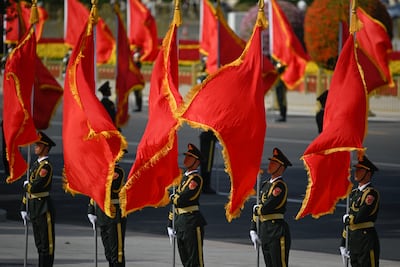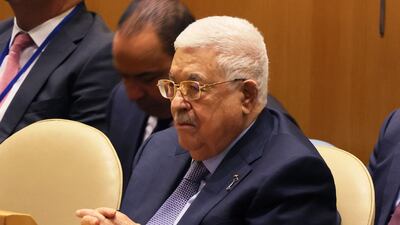Palestinian President Mahmoud Abbas will make his fifth official visit to China on Tuesday, on the 35th anniversary of diplomatic relations being established between the two.
The visit comes two months after Beijing told his Palestinian and Israeli counterparts that China is willing to help establish peace talks, while also expressing his concern over increased tensions.
The last direct peace talks between Israel and Palestine took place in 2014 and were organised by the US.
Mr Abbas's trip will make him the first Arab head of state to be received by China this year.
His last meeting with Chinese President Xi Jinping was held in Saudi Arabia last year.
But there are doubts the meetings will achieve much, as the ailing Palestinian Authority that Mr Abbas leads continues to lose popularity among Palestinians amid what many perceive to be rampant corruption and inefficiency in the organisation.
Hugh Lovatt, a senior policy fellow at the European Council on Foreign Relations, told The National that the trip is “a diplomatic notch for China as it looks to embarrass the US … For Abbas, it is nothing but a damp squib that will do nothing to end Israel’s occupation”.
“However, the trip also underscores the weakness of the Palestinian leadership as it searches for international support and a new peace broker. Abbas will come away empty-handed in both regards,” he added.
“Rhetoric aside, China has shown no willingness to invest serious diplomatic capital in the thankless task of trying to relaunch Israeli-Palestinian peace talks.”
Tuesday's visit in part signifies China's growing influence in the Middle East as the US is widely viewed to be stepping back from the region.

The head of Fatah's China relations Abbas Zaki said the visit demonstrates China's growing regional role following its involvement in a high-profile summit held between Riyadh and Beijing in December, Saudi Arabia and Iran's re-establishment of diplomatic ties and Syria's return to the Arab League.
In comments to Palestinian news agency Wafa, Mr Zaki said the trip is an indication that “there is no security or stability in the Middle East unless a just solution to the issue of the Palestinian people is reached in accordance with international legitimacy resolutions”.
“There is an expectation that China will have a greater role at the global level, and the more China progresses, the more fairness we will enjoy in Palestine,” he added.
He also spoke about the progress of a joint committee to boost trade and the importance of the government joining China's “Belt and Road” initiative, a global infrastructure development project.
China's growing role in the Israel-Palestine conflict comes as Israel's government, led by Prime Minister Benjamin Netanyahu, enacts some of the most right-wing policies in the country's history.
A number of its ministers have a history of far-right and anti-Arab sentiments.
They have pursued deeply controversial manifesto pledges at home and in the occupied Palestinian territories.
Since the inception of the government, ministers have pursued a judicial overhaul that opponents say could end democracy in Israel.

In Palestine, the expansion of settlements has led to fears that more Israeli encroachment in the West Bank could make a two-state solution impossible.
The framework is the preferred means for securing peace of the majority of the international community, including China.
Israel's radical policies have at points drawn rare criticism from the US, Israel's most important ally and a major source of military aid for the country.
Last week The Times of Israel reported that Mr Netanyahu had delayed plans to advance a controversial settlement plan following pressure from the Biden administration.


